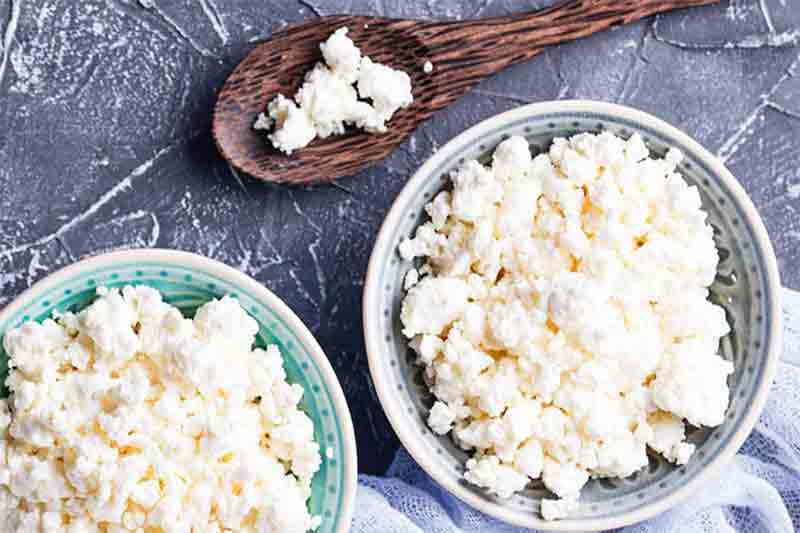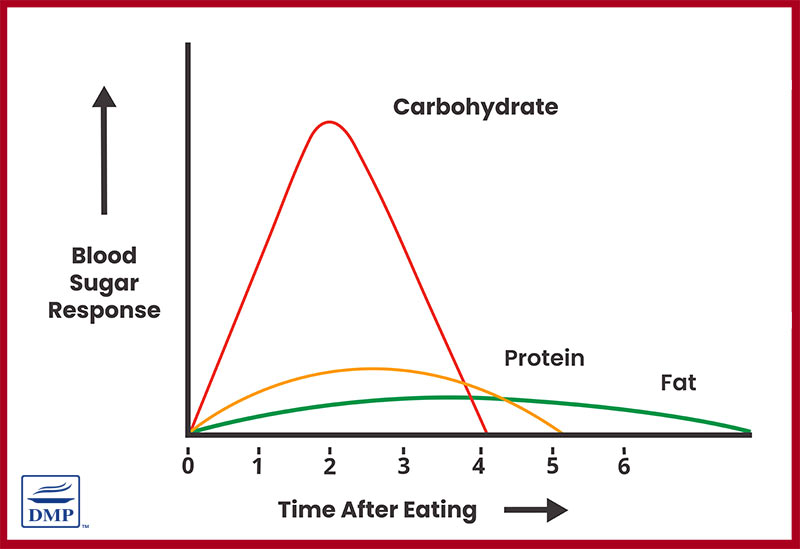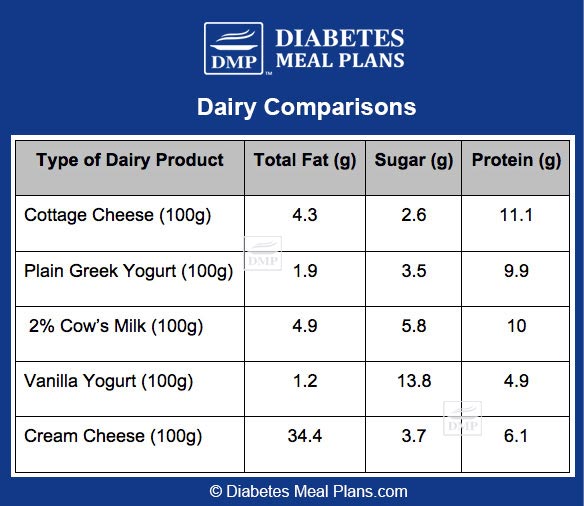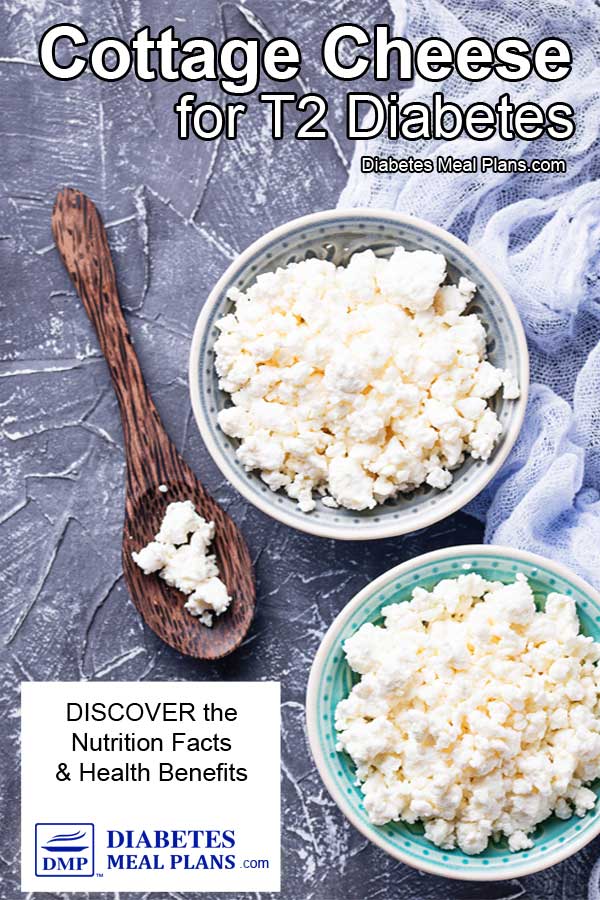If you enjoy the creamy rich texture of cottage cheese but have been wondering whether it’s suitable for diabetes, read on to discover the nutrition facts and health benefits.

What is Cottage Cheese?
Cottage cheese is a soft, curded dairy product that you can enjoy as a protein-packed breakfast option or as a hearty pick-me-up snack to help get you through an afternoon energy slump.
Unlike other cheeses, cottage cheese is extremely versatile and it can cater to both your sweet and savory cravings. Plus, you can serve it for breakfast, lunch, or dinner!
There are many reasons why cottage cheese is a great tool for folks trying to manage their blood sugar levels. So to start off, let’s look at the nutrition. What makes cottage cheese such a winning food for people with diabetes?
Cottage Cheese Nutrition Facts
Cottage cheese is somewhat of a wonder-food because of its protein-to-carbohydrate ratio.
While most dairy products contain quite a few carbs (in the form of lactose), cottage cheese is different. It has very few natural sugars and as a bonus, it’s rich in protein and fat.
Cottage cheese is also a “complete protein,” which means it contains all nine essential amino acids the human body needs. These amino acids are the building-blocks of bones, muscles, and internal organs, plus they have a role in regulating neurotransmitters and hormones that impact your mood and overall health.
Protein also plays a huge role in blood sugar management because it has a stabilizing effect. The point is, your body needs protein and lots of it!
Now let’s talk about fat.
Even though fat has been vilified in the past for its suspected connection to heart disease, we now know that fat is less of a villain and more of a hero.
The fats found in dairy products like cottage cheeses are great blood sugar regulators because fats only create a minuscule rise in blood sugar compared to the impact that carbs have.

Fats are metabolized more slowly and over a longer period of time so you don’t experience the sudden ups and downs that sugar causes.
Eating plenty of healthy fats (from dairy, eggs, fish, avocados, etc.) also keeps you feeling fuller for longer after a meal, so you can go for hours without heading towards the kitchen in search of food or breaking your diet by eating whatever junk food is close by. This keeps mindless snacking at bay and gives your digestion a much-needed break between large meals.
Besides being a great source of protein and fat, cottage cheese is also a good source of vitamins and minerals that play other important roles in the body.
For example, one cup of 1% fat cottage cheese contains the following nutrients (written as percentage Daily Value):
- Phosphorus: 30% DV
- Vitamin B12: 24% DV
- Calcium: 14% DV
- Selenium: 29% DV
- Riboflavin (vitamin B2): 22% DV
- Vitamin B6: 8% DV
Calcium and phosphorus are key minerals involved in bone formation, while selenium protects the thyroid gland, vitamin B6 helps regulate blood sugar levels, and vitamin B12 supports nerve function and helps your body sustain energy levels.
Cottage Cheese vs. Dairy Products
As we’ve already mentioned, a great advantage of cottage cheese is that it’s lower in carbohydrates when compared to some other dairy products. Here’s how it compares to yogurt, regular cow’s milk, and others:

Yogurt is a popular breakfast food, but it isn’t always the best choice for people with diabetes as it’s often high in naturally occurring carbs from lactose, not to mention that most mainstream yogurts are also packed with more than 10+ grams of ‘added’ sugars.
The exception to this rule is unsweetened Greek yogurt, which can be enjoyed in moderation.
Cottage cheese, on the other hand, is higher in fat and protein but contains fewer than 3 grams of sugars per 100 gram serving.
This is a major reason why cottage cheese makes a superior breakfast food over high-carb yogurts, or worse yet, those disastrous sugar-laden breakfast cereals!
Similar to cottage cheese, there are some other low-carb dairy products you can enjoy like cheddar, feta, and mozzarella cheese, as well as butter, cream cheese, and sour cream.

Research on Cottage Cheese and Type 2 Diabetes
Foods like cottage cheese are sometimes avoided because they contain saturated fats. After all, saturated fats are bad for you because they cause heart disease, right?
Not really!
The war against fats, particularly saturated fats, has raged for too long! It’s time to bring the cultural fears about fat and cardiovascular disease into perspective and listen to what the scientific research has to say about it.
Let’s start by recognizing that the case against saturated fat isn’t totally unfounded.
For example, the results of a 2015 literature review showed that a reduction in saturated fat intake could result in a small decrease in a person’s risk of cardiovascular disease. The implication that many people draw from this study is that saturated fat is the cause of heart disease, but this isn’t necessarily true.
Studies like that one help keep the “low-fat diet” message in the public sphere, but this isn’t the whole story. In fact, studies that connect dietary fat to cardiovascular disease are actually in the minority and there are many studies that debunk this old claim.
A 2012 study found no statistically significant connection between saturated fat intake and increased risk of cardiovascular disease. In fact, they found that a higher intake of saturated fat from dairy sources was associated with a lower risk of cardiovascular disease!
An even more recent study (2016) that included over 35,000 participants found that consuming dairy products high in saturated fats was not associated with a higher risk of ischemic heart disease.
Further, a 2015 study concluded that diets that include cheese as a primary source of saturated fats were less atherogenic (heart disease causing) than low-fat, high carbohydrate diets.
In this study, participants were placed on either a “high cheese diet,” a “high meat diet,” or a “dairy-free, low-fat, high carbohydrate diet.” After a two-week period, the high-cheese diet increased HDL “good” cholesterol by 5%, it increased apo A-I concentrations by 8%, and it decreased apo B/apo A-I ratios by 5% in comparison to the dairy-free, high-carb diet. All these changes seen in the high-cheese diet group are associated with a lower risk of cardiovascular disease.
In conclusion, it’s safe to say that most of the research is on the side of cheese, so don’t be afraid to enjoy full-fat dairy products like cottage cheese in your diet.
The Many Ways to Enjoy Cottage Cheese!
Cottage cheese is super versatile and can be incorporated into almost any kind of dish for any time of day.

Here are 6 ideas to get you started:
- Top a serving of cottage cheese with a small handful of low-carb berries and a sprinkle of stevia for sweetness. This can be a great replacement for traditional yogurts that are full of sugar.
- Blend a few tablespoons of it into a green smoothie to add satiating protein and an extra creamy texture.
- Cottage cheese makes a wonderful cream base for dressings, and it will add hearty fat and protein to a green salad!
- It also works as a thick, creamy base for a variety of sauces that can be poured over roasted vegetables or low-carb pasta.
- Mix it with eggs for a fresh take on a classic breakfast omelet.
- Stir herbs and spices into cottage cheese to make a flavorful dipping sauce. Pair it with raw vegetables for a healthy and filling snack!
What about you? Do you have other ideas on how to include cottage cheese in recipes and meals?
If so, please leave your comments below – we’d love to hear them. ;)

Vik Gurtu
Great article. Very helpful for those who want to optimise nutrition.
Shaunee
Hello
I am newly diagnosed T2, but may be able to not be, after a hiatus esophageal surgery. I am hoping for that to be the case, prayers. 👩🏽🌾🙏🏼💪🏼 Anyway, post surgery, my esophagus will need a liquid diet x10 days then increasing to smooth liquid, then mushier foods by 8 weeks. Since this will happen over my “lovely planned” Summer trips, can you recommend ways to decrease my weight, stomach adjustment, gradually so that liquid foods and seafoods will not feel like such a hardship for me. I will be in the middle states Trippin’ near the Chesapeake and I love clams. Will drinking boiled clam juice be a bad plan. Any suggestions to get the beachy/summer foods feel; that are low acid, low residue/not sticky to the throat and can be simpler fix. I have acquired a taste now for cottage cheese, but need Education about whey or soy products, tofu, and fermented foods. Can these things be blended in shakes with fruits or nuts so while I bike or row, I don’t feel like my muscles/energy is starved. I cannot get a covered nutrition consult yet, but I want to try to work towards my body adjusting well to this liquid diet and counteract side effects like diarrhea and loose stools.
Thank you,
Shaunee, Del
Jedha: Nutritionist (MNutr, PhD Candidate)
You could try smoothies or shakes, which can be made in minutes and you can blend cottage cheese, nuts and berries into these to make something delicious. We have some good protein powder options listed here.
Samantha
I’m starting to feel like a Rabbit!
Summer was fine despite my disabilities I was working hard in The6garden, busy occupied … eating Smoked Salmon as a meal 3 days a week with Green leaves & just a little dressing. I will now add Cottage Cheese to that … definition your advice here, u will add it to omelette & I think baked eggs?
However now it’s Winter. I’m feeling Cold & ‘annoyingly’ hungry. This is not usually me! At the moment I’m grazing on nuts simply because it keeps me happy & is easier than cooking, as I’m so unwell. I admit I’m struggling alone & trying hard with pages like yours to help me through. Regards Sam.
Emily - Dietitian (MS, RD)
Many people find they crave “comfort food” during the colder month– you’re not alone! And luckily, there is plenty of warm, cozy and low carb food options for you to pick from during the colder months.
Check out this Chicken Soup Recipe and Chili Recipe which both use a crockpot and reheat really easily throughout the week! Many of our readers also enjoy these pasta dishes as the weather begins to change. Lastly, you may consider subscribing to our weekly meal plans if you want even more delicious recipes emailed to you each week.
Joanna
Great article, thanks! In your yogurt article you mentioned the anti-inflammatory effects of the probiotics in yogurt, but the cottage cheese article doesn’t mention inflammation at all. Is cottage cheese (or any of the other cheeses you mentioned inflammatory or anti-inflammatory?
Jedha: Nutritionist (MNutr)
The thing that makes yogurt anti-inflammatory are the probiotics. Cottage cheese does not contain probiotics so it is not anti-inflammatory nor is it inflammatory, unless you have a food sensitivity to dairy.
Phyllis Baranowski
Your articles in DMP are very interesting but you do not address the diet concerns for people with CKD. Being a patient with Stage 4 CKD potassium and phosphorus are 2 things we must watch. Milk products are on the restricted list. Any diet suggestions for CKD dieters?
Jedha: Nutritionist (MNutr)
Thanks for pointing this our Phyllis. We do our best to cover many angles and topics but we currently don’t have a lot of information on our website that addresses CKD dieters so we will endeavor to provide more info very soon.
Kim
Jedha;
Hi,i love and enjoy eating cottage cheese as a snack,i use it in my healthy smoothies,with some berries on top of the cottage cheese,and i use plain yogurt in my healthy smoothies too.I have been having really good normal blood sugar readings for little while now but halloween is coming up in i think 11 days and i find it too much temptation to dig into my niece and nephew’s treat bag after they get home on oct.31st which puts up my blood sugar and even in the stores are selling bags and boxes of mixed candies and chocolate bars.
Can diabetics eat the little mini chocolate bars or the little bags of chips on oct.31st?This year i am not going to be home in our old house handing out the bowl of treats because my mom and i live in a 2 bedroom apartment together and is it ok to buy one box of chocolate bars to snack on after i have a meals after checking my blood sugar and do my insulin?
Kim
Do all diabetics have this same problem every year on oct.31st or on dec.25th with temptation treats?
Kim
Jedha: Nutritionist (MNutr)
Hi Kim, yes, many people have the same temptations at these times of year. We do have some info on candy that will be available next week. Of course it’s always better to avoid sugary treats but it can also be unrealistic so the key is to choose wisely and don’t overdo it.
Elliot
Lily’s has chocolate that is sweetened with erythritol and stevia instead of sugar. I eat it often with no apparent affect on blood sugar. Lakanto makes a chocolate sweetened by monk fruit.
Jedha: Nutritionist (MNutr)
Lily’s is a good option Elliot! There are many more options available these days, which is great!